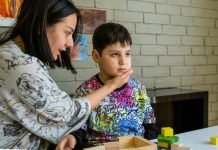
A new study conducted by researchers at the UC Davis MIND Institute has found that people with autism have different brain development than those without.
These differences have been linked to genes that are involved in inflammation, immunity response, and neural transmissions, and begin in childhood and continue throughout the lifespan.
The researchers’ aim was to examine how neurons in the brain communicate and interact with age and autism.
They looked at the genetic differences in brain neurons in people with autism at different ages and compared them to those with typical development.
Previous studies have shown that certain brain regions mark early excess, followed by reductions in volume, connectivity, and cell densities of neurons as people with autism age through adulthood.
In the current study, the researchers analyzed brain tissues from 27 deceased individuals with autism and 32 without autism, ranging in age from 2 to 73 years.
The study found that people with autism have 194 significantly different genes in their brains compared to those without autism.
Of those genes, 143 produced more mRNA and 51 produced less in autistic brains than in typical ones.
The downregulated genes were mainly linked to brain connectivity, which may indicate that neurons may not communicate as efficiently.
The team also found that more mRNA for heat-shock proteins was present in autistic brains, which respond to stress and activate immune response and inflammation.
Additionally, there were differences in inflammation patterns in autistic brain tissues, indicating immune dysfunction that may worsen with age.
The researchers also found different inflammation patterns in autistic brain tissues. Several immune and inflammation-related genes were strongly upregulated, indicating immune dysfunction that may get worse with age.
The study found direct molecular-level evidence that insulin signaling was altered in the neurons of people with autism, and noted strong similarities of mRNA expressions in the superior temporal gyrus region between people with autism and those with Alzheimer’s disease.
These expressions may be linked to an increased likelihood of neurodegenerative and cognitive decline.
The researchers suggest that identifying changes in brain development over time in individuals with autism provides an opportunity to think about interventions that might be more useful during certain periods.
If you care about autism, please read about studies about a new cause of autism, and vitamin D could help lower the risk of autoimmune diseases.
For more information about health, please see recent studies about rare blood clots after COVID-19 vaccination, and gut health plays a role in autism.
The study was conducted by Pan Zhang et al and published in PNAS.
Copyright © 2023 Knowridge Science Report. All rights reserved.



